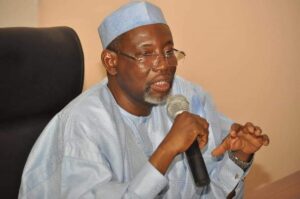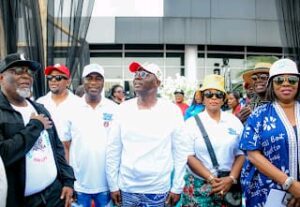Lagos, electricity policy and sustainable power supply
Apart from being the nation’s commercial nerve center, Lagos is also the most populous State in the country.
The State alone harbours about 60 per cent of the Federation’s total industrial investments and foreign trade while also attracting 65% of Nigeria’s commercial activities. If it were a country, Lagos would have been the fifth largest economy in Africa.
Unstable electricity supply is, however, a major threat to the state’s continued socio-economic ascendancy. As it is with other states, Lagos depends entirely on the national grid for its electricity supply.
Through its two resident electricity distribution companies (Discos) – Eko and Ikeja – The state receives just about 1000MW for an average of no more than 12 hours daily, i.e., 12,000 megawatt-hours (MWh), for a population exceeding 25 million.
According to a research conducted by the Lagos State Electricity Board (LSEB) a few years ago, 15,000MW of the estimated 45,000MW of alternative power supply in the country was located within Lagos state alone.
As at 2020, 31% of households in Lagos are connected to the grid. This implies that currently, 69% of households in Lagos are effectively off-grid. The implication of this is that a larger percentage of Lagosians depend on generating sets for their power need.
Curiously, if Lagosians’ 15,000MW of generating set capacity was available to them on the grid, they would save up to =N=5.2trn p.a. in fuel costs alone!
As the state’s population and the attendant energy consumption levels continue to rise, it is important that an enabling environment is created for the sustainable production and supply of reliable energy for residents.
It thus becomes obvious that Lagos cannot rely on the national grid alone for a sustainable, long-term, socio-economic growth and significant growth in its citizens’ standard of living. It is also clear that current estimates of unmet demand are grossly understated.
The State is presently witnessing the continuous flow of new residential, commercial and industrial developments and investments such as the Lekki Free Trade Zone, Dangote Refinery, Eko Atlantic Project, numerous housing schemes and estates among others.
As it tries to manage its evolution into a 21st century economy, with the attendant need to meet urban planning standards and satisfy the demand for various social amenities and economic opportunities, it has become clear that Lagos State needs to establish the enabling environment for a unique electricity market that is separate from (or off) the national electricity grid, but is also connected with the latter.
A number of requirements are critical to implementing a holistic solution that delivers clean, adequate and reliable electricity supply within the geographical territory of the State and to all its demographic/customer classes.
These include an enabling constitutional and legal framework; an integrated resource plan; an autonomous, credible regulatory body; competitive and transparent procurement of generation resources and a bankable commercial framework.
Others are an Independent System Operator, well-funded, well-managed generation, transmission and distribution players; and collaborative support for market growth/customer satisfaction by both the federal and state government.
No doubt, a fresh thinking on how best to deliver reliable power supply to Lagosians is desirable. Characteristically, the Babajide Sanwo-Olu administration has come up with a framework to address this glaring imbalance.
The Lagos State Electricity Policy will give insights into the government’s thinking about the legal, engineering and commercial frameworks required to create a viable sub-national electricity sector that is entirely off-the-national-grid but nevertheless caters fully to the needs of its citizens. The policy is expected to drive development towards a future where security and sustainability of electricity supply is assured.
The Policy will serve as a blueprint for the vision to achieve universal access to electricity in the State and will also accelerate the “Light-up Lagos” initiative when it becomes operational. It will also serve as a major stimulus for the state’s social and economic development aspiration, in line with the Government’s 30-year Development Plan (2021 – 2051) being developed.
The Policy is, thus the outcome of a determination by the government that unless a conscious effort is made, the evolution of Lagos into a modern and inclusive city-state will be retarded to the point of reversal and socio-economic degeneration. The Sanwo-Olu administration is prepared to do everything possible to avoid such fate.
The policy is to focus on achieving significant reduction in back-up generator emissions and the fostering of a natural gas market in Lagos via a programme to transit Lagos back- up gen set fleet from distillate fuels to cleaner gas fuels.
It is also to establish and implement a sustainable programme for delivering electricity access – minimum 50MW/20hrs daily per annum – to the served and underserved areas of the State. Hence, it is envisaged that by 31st December 2039, there will be availability of reliable electricity in the Lagos Electricity Sector without general recourse to alternative generator capacity
In recognizing that delivering access to reliable electricity in Lagos cannot be achieved by the government alone, key stakeholders in the State, the national and global community, especially industry experts and private investors, have been rallied to provide robust responses to the Consultation Paper.
The government’s resolve to evolve a strategic policy that will enhance a stable electricity supply in the state is quite logical. For instance, stable power supply will enable the state unleash the possibilities of the economy beyond imagination.
Small businesses within the state will, no doubt, thrive better if more creative schemes are put in place to guarantee un-hindered power supply. Equally, multi-national firms that have closed shop in Lagos because of the epileptic nature of power, could be lured back if the power situation improves.
This would not only bring back lost jobs, but will certainly restore lost ones. Similarly, regular power supply will, no doubt, lead to a much safer Lagos where every inch of it is lit up at night.
It is quite clear that our country would not be able to accelerate its socio-economic growth unless concerted efforts are made to develop creative initiatives that could confront and overcome current power situation.
As the most populous Black Country0, we need to do more in respect of adequate power generation and effective distribution. The top 20 countries of the world such as China, which is currently the world’s largest producer of power, South Africa and Mexico, among others, generate power in excess of their demand.
For the energy need of the Lagos to be effectively met, efforts must be made to ensure proper alignment of the entire value chain of power generation, transmission and distribution. Equally, the development of emergency power system, increased partnership with Independent Power Plant (IPP) producers, the creation of necessary institutional frameworks and facilitation of an enabling environment would go a long way to accelerate power delivery to the state.
If effectively formulated and implemented, the electricity policy would help accelerate the socio-economic development and growth of the state, since effective power delivery is central to the realization of the state government’s Greater Lagos vision.
Given the centrality of Lagos to the overall economic prosperity of Nigeria, it is essential that the state government continue to support new initiatives, ideas and visions that could improve power delivery in the state and, indeed, the country at large.
Tayo Ogunbiyi is of the Features Unit of Ministry of Information and Strategy, Alausa, Ikeja,Lagos




